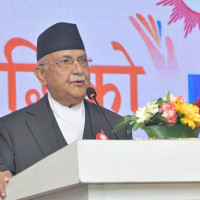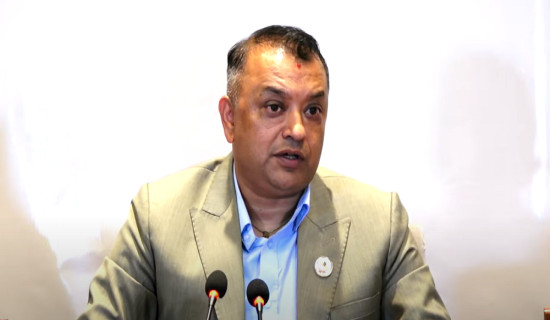- Thursday, 19 February 2026
Sociocultural Dimensions Of Deuda Folklore
Deuda is a folklore combining the folksongs articulated extempore in the form of couplets in folk verse, and their synchronised performance which is typically popular among the hilly communities in the Far and Midwestern regions of Nepal. Deuda is one of the principal and ancient folkloric heritages surviving through oral transmission across generations in these topographies. Deuda is not only a song in isolation, but also a folksong embedded with folkloric performance, a typical dance. The folklore has its own characteristics and has specified norms of movement, beats and footsteps which are to be followed duly during performance thereby making it an all-season celebratory folk culture.
According to the Bikram Sambat calendar, the month of Bhadra has already entered our households with the Olkei Sankranti, and has many festivals are in store including Haritalika Teej, Gaura, Shri Krishnajanmashtami, etc. With monsoon still replete in the clouds and the greenery lush in the fields and nature, these festive occasions offer the women and the men here with plenty of moments to engage in singing the Deuda folksongs and dancing accordingly. Upon celebrating religious festivals by observing fasts and worshipping the deities, the locals relish by expressing their societal experiences and personal emotions through Deuda. The couplets of Deuda folksongs sturdily encompass every emotion, theme and subject matter of life.
With larger sociocultural relevance and significance, although Deuda offers abundant scope for studies, this essay dwells on the following specific dimensions of this cultural heritage:
Continuity and celebration of ancient tradition: Deuda folksongs have been practiced since time immemorial by the followers of Sanatan dharma of the hilly origin in the far and mid-western parts of Nepal albeit dwelling anywhere. When the people celebrate various festivals and rituals at homes, temples and public places, they express their delight and infelicity of daily life, praise and prayers to divinity, and observations of existence through performing Deuda at any suitable moment. Performance of the folklore embodies the knowledge, thoughts, understandings, feelings, emotions and interests of the performers which have been assimilated in the livelihood as a tradition.
Women’s involvement and liberty: As the patriarchal nature of society hitherto has otherwise restricted women from different opportunities, every female member in every house has to undergo diverse subjugations, exploitations, and deprivations at different phases of life. Deuda folklore, however, tends to be more egalitarian in the sense that it avails more space, dignity and involvement to women in singing and performance activities, wherein they can express their heart without fearing arbitrary social limitations. The married women seem to rescue themselves from the bottom of sufferings and shortages, and immerse themselves deep into the tunes and styles of Deuda performance, which functions for them as the platform of liberty.
Social unity and siblinghood: Although the caste system and the resultant social discrimination has already been criticised and abrogated even from the State level decades before, the social ills and its inhuman repercussions still persist pushing the society into division. Moreover, people keep brewing sour relationship with neighbours owing to conflicting political ideologies. Similarly, the void created by the class disparities between the rich and the poor have further caused fragility to the foundation of the society. In contrast, the landscape of Deuda folklore functions like a confluence dissolving all sorts of such differences, frustrations and discriminations thereby allowing every enthusiast to join the performance and lead the chorus if one’s prowess deserves it, without any inquiry of the class, caste and politics of the performer. The participants, divided into two contesting groups, support in full spirit their lead singer showing the feeling of the highest unity and siblinghood to ensure their group’s victory in the duet.
Morale booster for the subalterns: Singing and performing Deuda songs help farmers, laborers and victimised ones release the internal and external pain and pangs while no other means is available. When the world looks indifferent towards the tears of any helpless individual, these songs become an ultimate resort to escape even momentarily from such harshness of life. Furthermore, the people at the grassroots level of the society opt to sing Deuda songs so that they can wash out every burden in their heart and lighten it in the melodious stream of the songs. They often sing in the popular tragic tunes like ‘Kathai daina…’ ‘Meri Eeju…’, ‘Kathai laadi…’, etc. and attempt to communicate to the providence and conquer it. By so doing, these people strive to boost moral confidence to combat the adversities of life and renew survival afresh.
Reflection of Livelihood: Deuda songs are typical to the geographical setting and the livelihood of the native people. Hills, ravines, birds, flora and fauna, etc. often get sung in the songs of people so vividly in the mother tongue. The highs and lows of a hilly life, the caravans of traders, the stories of spades and farmers, the torments of the married women in the in-laws house, the unemployment and separation-- all these issues are made the subject matters of the singing, which is in fact reflective of the general life of the villagers in the countryside. Thus, Deuda constitutes an integral part of the folk life.
Instrument of local identity and national unity: Most importantly, Deuda folklore is associated with the people of the Kali-Karnali region of Nepal as a medium of identity. In the milieu of implementing federal governance system in the nation, Deuda songs have been a cultural heritage and a symbol of recognition for the people of the Farwestern province. Moreover, there are a number of such folkloric heritages across the country in the form of songs, dances, paintings, lores, legends, etc. that contribute to the fabric of nationality. The ruling class needs to consider and accept all the folklores as a key element to strengthen the sense of national unity by ensuring the equal treatment and dignity to the folklores of the peripheral communities. My belief is that once all communities feel that they are respected, it shall contribute to bolstering the feeling
of one nation.
(The author is a folklore researcher and poet. tirthraj08@gmail.com)
















